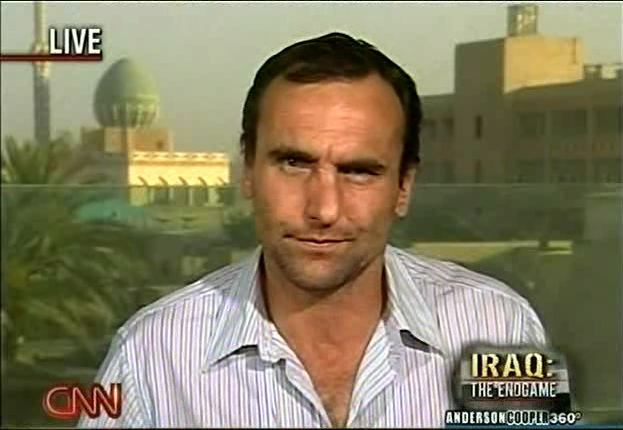AC: "Of all his cabinet ministers, there's only three he can actually rely on."

Length: 5:47
LARGE (67.7 MB) ----- SMALL (6.6 MB)
(BEGIN VIDEO TAPE)
U.S. PRESIDENT GEORGE W. BUSH: Despite the mistakes that have been made, despite the problems we have encountered, seeing the Iraqis through as they build their democracy is critical to keeping the American people safe from the terrorists who want to attack us.
(END VIDEO TAPE)
ANDERSON COOPER: President Bush today telling the Veterans of Foreign Wars that America needs to stay in Iraq to give democracy a chance. Speaking to crowd that largely believe that pulling out of Vietnam was a mistake, he said leaving Iraq will be a similar mistake. Now, people differ on that but most agree that the symptoms of the Vietnamese and Iraq entanglements are starting to look eerily alike: troops win every battle but can't seem to finally win the war, the Baghdad government barely functions, growing rumors of a coup, and even as the president pushes the goal of democracy, his top men in Iraq are lowering the bar. General David Petraeus and Ambassador Ryan Crocker saying today, "We are now engaged in pursuing less lofty and ambitious goals that was the case at the outset." Subordinates went further.
BRIG. GEN. JOHN BEDNAREK, U.S. ARMY: The democratic institutions is not necessarily the way ahead in the long-term future.
COOPER: General Bednarek there talking with CNN's Michael Ware who joins us now from Baghdad, along with former presidential advisor David Gergen who is in Boston.
Michael, if it's not democracy U.S. officials are saying is achievable, what are they hoping for?
MICHAEL WARE, CNN CORRESPONDENT: Well, Anderson, officially the mission is still plugging away for democracy, but what they're saying is it's not the democracy that President Bush and the policy makers once had in mind. The bar, as you say, has definitely been lowered. However, there is much talk, rising talk among the military field commanders that perhaps what's needed is what former prime minister Ayad Allawi -- and a leading U.S. political ally -- has been calling for: an emergency government, just something that can lock this country down, can stabilize it, can try and finally bring an end to some violence and restore stability so that democracy will have some time to grow. They are saying "stabilize first, not democratize," and they are looking to American Arab allies, none of whom are democracies, yet they're able to deliver services to their people and they're an ally in the war on terror.
COOPER: Essentially they are talking about some sort of Iraqi strongman. Are officials optimistic? On the ground, the military, how do they view Maliki's government? Are they optimistic that his government, if you can really call it his government, can make progress on these so called benchmarks?
WARE: Again, you're right, Anderson. This really is not the Maliki government. Prime Minister Maliki is a man without power. The currency of power in this government, a government of loose coalition of militias, is how strong is your militia? How many men with guns do you have? And the prime minister has none. And according to one senior U.S. official of all his cabinet ministers, there's only three he can actually rely on. So he can't force his own government to really do anything anyway.
So honestly, the heart of this government lies with the militias, most of whom U.S. intelligence says are backed by Iran. So to be honest, most American commanders do not regard this government as an ally in the war on terror or even in the project here in Iraq.
COOPER: David, I guess it should come as no surprise that U.S. officials are kind of trying to lower the bar in terms of speaking about democracy, speaking about some of the loftier things, to use the phrase that Petraeus and Crocker used, that they spoke about years ago.
Obviously, we are having a problem with David's audio. We are going to try to get that fixed. Let's go back to Michael Ware in Baghdad. Michael, how surprised were you -- President Bush has always sort of avoided the comparisons to Vietnam. Have you heard -- do troops on the ground, commanders you talk to, do they make Vietnam analogies? And if so, in what capacity?
WARE: Well, by and large, Anderson, people are extremely wary of intoning the name of the Vietnam War. They know that there's a lot of American societal, cultural baggage that goes with it. So they really don't like going there. But what they look to from Vietnam obviously is counter-insurgency strategies and primarily the need to stay the course, as the prime minister says. The question for them now is, "forget Vietnam. We have a mission here. We are supposed to be trying to instill a democracy here but we have bungled it so very, very badly, that we actually have in place now a government that, if it's not hostile to U.S. interests, certainly is doing nothing to serve U.S. interests." So what they are looking for as opposed to Vietnam is a government that they can actually work with and go forward.
COOPER: Let's try to check in with David Gergen again to see if we have his audio. David, do we have you? No, we don't. We will continue to try to work on that.
Let's take a short break. We will be right back.
